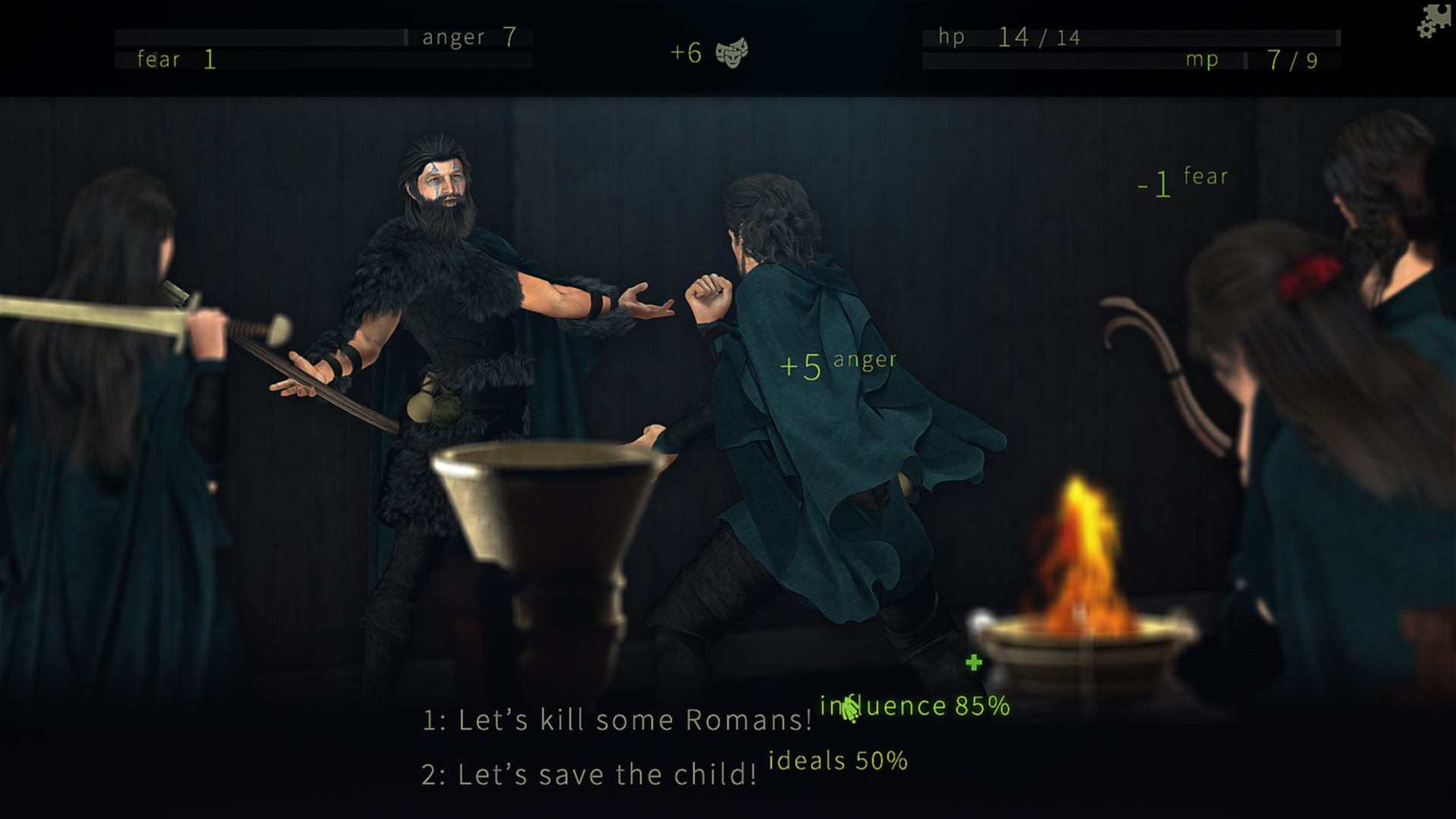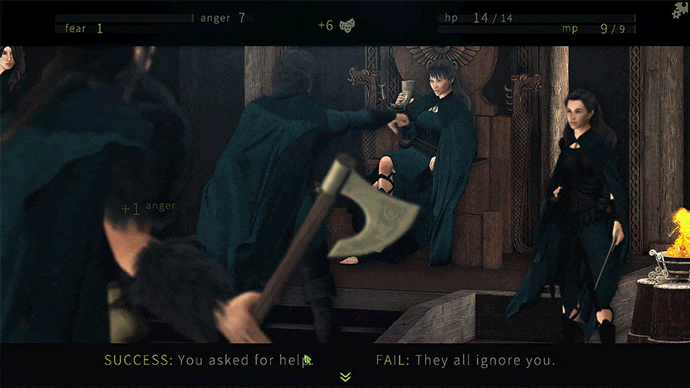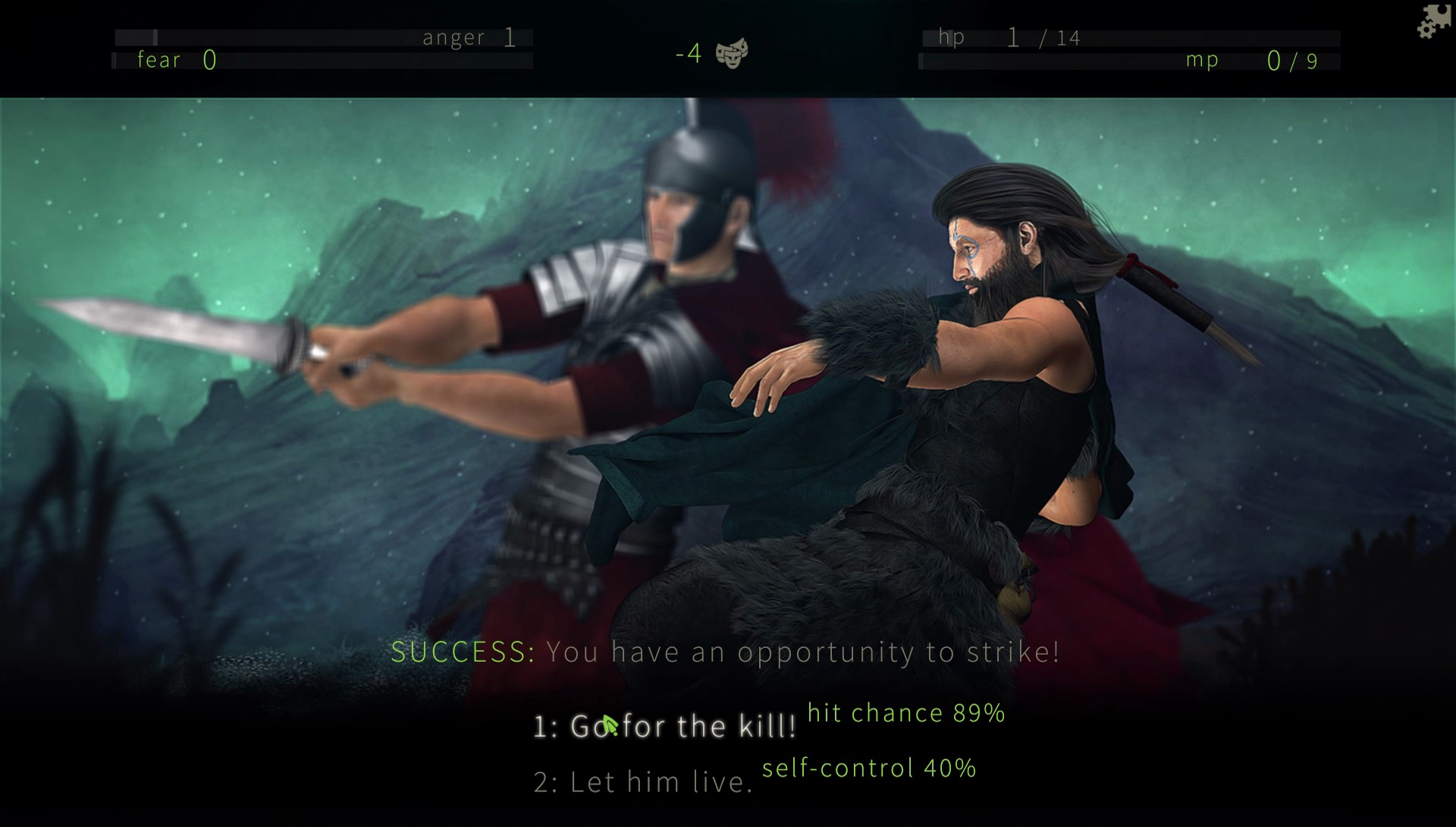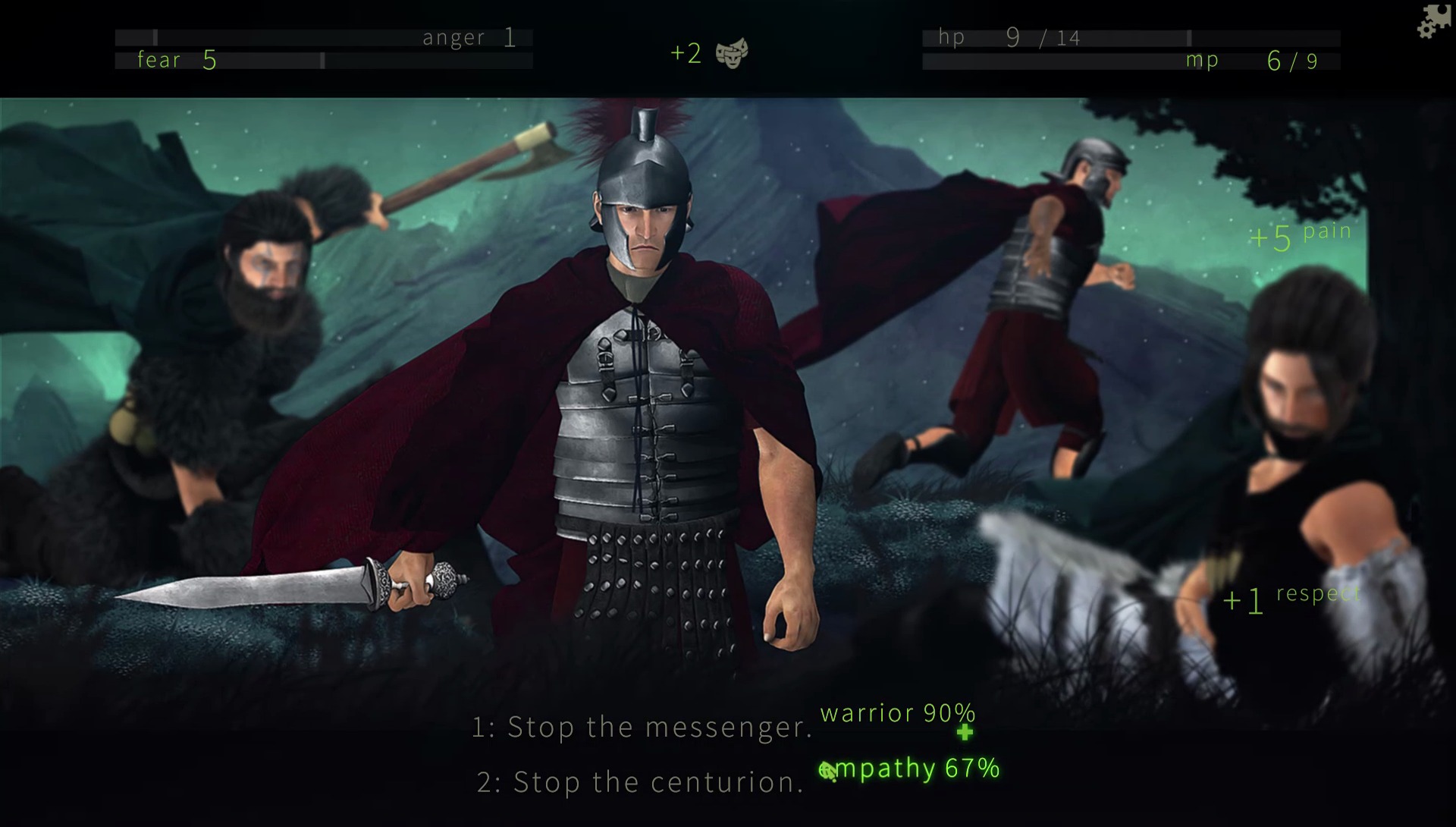A couple of days ago we’ve received a great question from Kamen42 in the comments section of our Kickstarter. He was rewatching Sacred Fire trailers and had an intriguing idea: wouldn’t it be more fun if we hid the success probabilities of choices in Sacred Fire? And the idea seemed so interesting, that Andrej wrote an insightful answer that deserves a full-blown Design Focus update.
If you’d like to refresh how probabilities work in Sacred Fire, you can watch our developers commentary:
First, here’s the question from Kamen42. It’s a shortened version of his original comments. And below it is Andrej’s take on it.
Kamen42: “With each action there are percentages of success. I was wondering if there will be a mode where these percentages are not visible. I think it would be really interesting to play without knowing what chance of success your actions have.
When players have several options how to act, they usually have one that they like the most. However, when they see the chances of success, they might be discouraged and end up doing something else.
I caught myself doing this several times when playing games like Torment. After that I sometimes had a feeling that I don’t play the game, that I am merely doing what the game suggests I should do.
Sure, turning the percentages off would definitely lead to making some bad decisions, some that are doomed to fail, but that way the story is entirely in the player’s hands. We would be the ones making the decisions. And if we fail, at least we fail doing something we believed.”

So are probabilities ruining role-playing experience?
Andrej, Creative Director at Poetic: Kamen42, it’s great to see people care so much for Sacred Fire to be the best possible role-playing experience. I appreciate the effort you put into explaining your question.
I had a similar experience to what you describe in a couple of RPGs. You are right to be concerned about it, as it ruins the role-playing experience in my opinion too.
We have spent a lot of time on identifying how to solve this. And we will spend more time testing and listening to your feedback. Your solution is one of several, but it’s too early to say, yes, we will do it this way. Let’s wait and see how the game plays and then we can make the right call.
I think there are many factors in the issue you describe: UI design, game rules, and the actual writing:
- What are the choices? How different are they? Is one clearly ‘right’?
- What are the consequences of a failure?
- Do you get to retry a failed choice?
For example, in Sacred Fire especially early in the game, when you haven’t built up your inner strength and influence in the society, you struggle to speak up. If you fail, no one knows but you, right? No one notices.

The game lets you try as many times as you like. You just get more frustrated (Anger+) or scared (Fear+) with every try, based on your personality and the circumstances: what’s at stake in the situation. And your emotions change the odds, anger will help you speak up, fear won’t.
There is something satisfying about having a choice you know is hard and likely to fail and still staying true to yourself and passing it. Especially if it costs you something rare or limited: your willpower points or a few seconds of your time. And once you do this, it strengthens your inner power in-game, so you are rewarded for taking the less likely choice.
That being said, playing to your strong sides builds positive memories and confidence, so the game doesn’t reward you just for hard choices. But too much confidence strengthens both your pride and aversion others feel toward you and you will have to deal with new interesting challenges.
This way, the player will gradually un-learn to play by probability and learn from experience with the game. You are free to choose and know the game will reward and test you and make the consequences interesting. This way you are free to role-play.

Furthermore, in Sacred Fire it’s YOU who determines what your character is most likely to do in the given situation. So, it’s not the game telling you what to do. The game is reacting to your character creation, tracks your choices and provides consistency to your role-playing exactly through the probability.
It may happen that our system is so well balanced after time, that you won’t need the probability to be displayed, just say this is a risky choice, out of your character, out of your skill set. But as I said, it’s too early to say.
Also, if you really like a choice and it has low chances of success, in Sacred Fire you just have to pay for it with your limited willpower resource, which means you really believe in this choice.
Also, as far as reality goes, in most situations, you pretty much know what your chances are, because probability is nothing else than how many times I have to try before I get it right. Or in other words, I know from experience that I have tried ten times to reason right off the bat with my neighbour when he complained about noise and it never worked. So I know that my chances to work this out when he shows up or when I speak to someone else complaining, are better if I let them vent first.

As far as physical action goes, I think the same applies. For example, I’ve played recreational soccer all my life. I don’t think I’m special and still in a match in the heat of the battle I can make split seconds decision based on the thousands of experiences I had trying something and failing or trying something and succeeding. That’s just how our brains and muscle memory works, how an activity becomes second nature to us after time. I know at what distance and angle my shot is likely to score, and when it’s better to pass the ball.
I imagine an ancient warrior in Caledonia has spent much more time shooting bow, than a modern man playing soccer. And the other players (or warriors) know the odds too, so if you score from an impossible angle, or hit a fast-moving target with your arrow, it’s going to create respect and renown for you.
This way in Sacred Fire you are motivated by winning to take the easy shot and you are motivated by prestige to take the hard one. It’s all about WHO you want to be, or even better, it’s about understanding a little bit better, through role-playing, who you, the real you, are.
I’m happy people share our passion for creating role-playing that is immersive and becomes your self-expression. This is what Sacred Fire is all about.
PS. We’ve got a new way of supporting the development of Sacred Fire. In addition to upgrading your Kickstarter pledge via Paypal and late-backing on Indiegogo (tell you friends), you can also donate with Paypal. All funds raised through crowdfunding and donations will go directly towards making Sacred Fire the best it can be. We will add more polish, voiceover and improvements to the core gameplay.
Blog
Archives
- February 2024 (1)
- January 2023 (1)
- August 2022 (1)
- February 2022 (1)
- December 2021 (1)
- November 2021 (1)
- October 2021 (1)
- September 2021 (1)
- July 2021 (1)
- June 2021 (2)
- March 2021 (1)
- February 2021 (1)
- December 2020 (1)
- October 2020 (1)
- September 2020 (1)
- August 2020 (1)
- July 2020 (1)
- June 2020 (1)
- April 2020 (1)
- March 2020 (1)
- February 2020 (1)
- January 2020 (1)
- November 2019 (1)
- October 2019 (1)
- September 2019 (1)
- August 2019 (1)
- July 2019 (1)
- June 2019 (1)
- April 2019 (1)
- February 2019 (1)
- December 2018 (1)
- September 2018 (1)
- July 2018 (1)
- June 2018 (1)
- March 2018 (1)
- February 2018 (1)
- December 2017 (1)
- November 2017 (2)
- October 2017 (1)
- September 2017 (1)
- August 2017 (1)
- June 2017 (1)
- May 2017 (1)
- April 2017 (1)
- March 2017 (1)
- January 2017 (1)
- December 2016 (3)
- July 2016 (2)